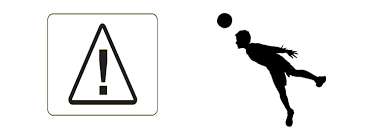
In what could be a watershed decision, professional footballers in Scotland are going to be banned from heading a football in training sessions, both the day before and the day after a match. Additionally, clubs are also being told that they should limit exercises that involve repetitive heading to just one session per week.
The Scottish Football Association (SFA) already has guidelines in place restricting headers in youth football, with a ban on heading in training for the under-12 age group, but this now takes it a significant step further.
Clubs consulted before decision
Scotland was the first country in the world to have a single set of concussion guidelines for all sports, with their “if in doubt, sit them out” campaign. This latest development comes after consultation with the 50 clubs across the professional men’s and women’s game, together with an instruction to monitor heading activity in training at all times, with the aim of reducing the overall burden of contact.
Chief gathered training data used
The SFA’s chief football officer, Andy Gould, said there was already a great deal of data around in-match heading; however, the latest research had been invaluable in understanding the extent of heading load that was undertaken within the training environment. He added: “I am grateful to the clubs, managers and players for providing us with the information and perspectives required to facilitate an informed and data-driven discussion which has culminated in the publication of these guidelines.”
Dementia a genuine risk after heroes succumb to dreadful disease
Several high-profile former players have died from dementia in recent years, including members of the triumphant England 1966 World Cup winning team. It seems that now the penny has finally started to drop with those in authority, that there should be genuine concern in connection to the science that is being put forward, which continues to link football to long-term brain injury. It does appear that defenders, who statistically head a ball more often during the course of a game, are at greater risk, so these changes are seen as a definite force for good.
Cautionary acceptance for change
Although many teams now play a possession based style, with the emphasis on short passes, there will always be a requirement to head the ball, especially from corners, free-kicks, and throw-ins. Some have suggested banning it all together, but that basically kills the game that many love, but their argument would be that is better than killing somebody that is loved. It is a very tricky subject, but this does represent an acceptance that something had to be introduced, rather than constantly turning a blind eye to it.
Alarming research figures prompting action
These new guidelines follow research carried out at Glasgow University which identified that former footballers were a staggering three and a half times more likely to die from brain disease and this, their findings could they believe, be linked to repeated heading of a football.
Dr John MacLean, who has been the SFA doctor for more than 20 years, said: “While the research continues to develop, what we already know about heading and its effects on the brain suggests that there is measurable memory impairment lasting 24-48 hours following a series of headers.” He added that it was all about collective responsibility and safeguarding player health and well-being.
Difficult to impose
Other nations will be looking on with interest and there is every likelihood that pressure will be placed on them to follow suit and implement similar bans. The FA in England has already introduced guidelines for clubs that limits players to 10 high impact headers per week, during training; but these are just guidelines, and at the very top level, it is unlikely that they are being adhered to, particularly when it comes to dead ball situations that require players to use their head.
Set-piece routines will need restructuring and rescheduling
Players will undoubtedly be a little sceptical, as fundamentally they are from now on, being told to suppress a natural instinct in training, that the vast majority of players possess, which is to head the ball; wingers excluded. Most will support the move up to a point, but there probably will have to be some sort of balance struck.
It may well lead to a complete change in the training programmes set up by the coaches. Most if not all, would usually work on set-piece routines, defensively and offensively, on the day before a game, but that may now shift 24 hours and some serious restructuring take place.
Possible change to playing philosophy
The last thing a manager would want is a player to develop a habit of ducking out of headers, but equally, if it encourages players to keep the ball on the deck, that that could be a positive, depending upon an individuals outlook on the game. Maybe in ten years time everybody will be playing like Brazil!












0 Comments